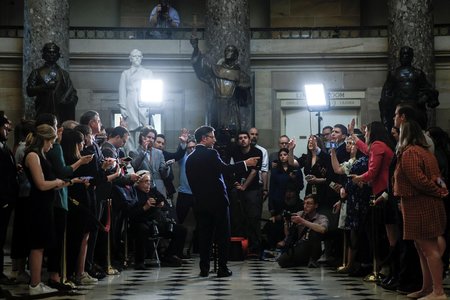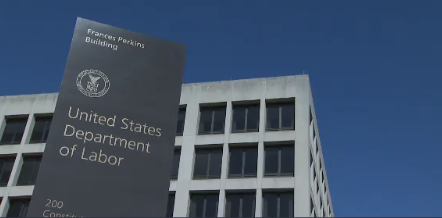President Trump reverses course on separating families at the border and the political, social, and ethical ramifications continue to reverberate. After a turbulent week, the panelists discussed the immigration crisis and the challenges ahead.
Full Episode: Crisis at the border and in Washington
Jun. 22, 2018 AT 10:15 p.m. EDT
TRANSCRIPT
Notice: Transcripts are machine and human generated and lightly edited for accuracy. They may contain errors.
ROBERT COSTA: A crisis at the border and in Washington. I’m Robert Costa. We discuss President Trump’s zero-tolerance immigration policy and its cost, both political and human, tonight on Washington Week .
PRESIDENT DONALD TRUMP: (From video.) We’re going to keep families together, but the border is going to be just as tough as it’s been. (Cheers, applause.)
MR. COSTA: President Trump insists the administration’s hardline immigration stance remains, but does an about-face on his policy of separating children from parents who enter the country illegally. Amid the firestorm, the president blames Democrats.
PRESIDENT TRUMP: (From video.) Democrats don’t care about the impact of uncontrolled migration on your communities, your schools, your hospitals, your jobs or your safety.
MR. COSTA: And Mexico.
PRESIDENT TRUMP: (From video.) Mexico is doing nothing for us except taking our money and sending us drugs.
MR. COSTA: On Capitol Hill, House Republicans postpone a vote on a long-term legislative fix.
REPRESENTATIVE JEFF DENHAM (R-CA): (From video.) Well, we’ve all been in negotiations for the last several weeks. We’re going to spend the weekend, delay a vote till next week.
MR. COSTA: But the president tells them to stop wasting their time trying to pass legislation before the midterm elections. What’s next for the more than 2,000 children waiting to be reunited with their parents, and what’s next in Congress?
We examine the challenges ahead with Nancy Cordes of CBS News, Michael Shear of The New York Times , Yeganeh Torbati of Reuters, and Dan Balz of The Washington Post .
ANNOUNCER: This is Washington Week . Once again, from Washington, moderator Robert Costa.
MR. COSTA: Good evening. Dramatic and stark images of thousands of children at the border separated from their families transfixed Americans and people abroad, and stoked international outrage.
More than 2,300 children have been taken from their parents since early May since they crossed the U.S.-Mexico border without documentation. Inside the converted warehouses and tents, children alone without parents, confined in chain-link spaces and sleeping on floor mats. Reports that the government was holding infants and toddlers in so-called tender age shelters proved to be a tipping point. Lawmakers visited the border and there was global outrage. British Prime Minister Theresa May delivered a sharp rebuke.
BRITISH PRIME MINISTER THERESA MAY: (From video.) The pictures of children being held in what appear to be cages are deeply disturbing. This is wrong.
MR. COSTA: Pope Francis called the policy immoral. For days the president and his administration blamed others.
PRESIDENT TRUMP: (From video.) I hate the children being taken away. The Democrats have to change their law. That’s their law.
HOMELAND SECURITY SECRETARY KIRSTJEN NIELSEN: (From video.) Congress and the courts created this problem, and Congress alone can fix it.
MR. COSTA: On Wednesday the president did what he said he couldn’t do: he signed an executive order stopping the government from separating families. The action allows families to be detained together, but not for more than 20 days.
Nancy, we saw the president signing his name on that executive order, and that executive order could be challenged in the courts. We also saw those images of stone-faced congressional Republicans. What’s next for them on Capitol Hill?
NANCY CORDES: It’s very unclear. You know, on one hand they’ve got this legislation, this compromise bill, a compromise between moderate and conservative Republicans. They were hoping to hold a vote on Thursday, then that got shifted to Friday, now perhaps next week. But as the president tweets that they should just give it all up, that’s leading some Republicans to say why should I stick my neck out there and vote for legislation when I don’t even know that the president is going to back it. And then you’ve got moderates who say but if you don’t hold this vote, we want to try and push our own legislation. And so Republican leaders are really caught in a Catch-22 here, holding a vote next week on a piece of legislation that could fail, looks even worse for the GOP, and then what does Congress do?
MR. COSTA: Could there be something narrow? Something that maybe increases the amount of judges who are dealing with these cases?
MS. CORDES: That’s plan B. And you’ve got a lot of Senate Republicans who are pushing for something that looks like that. But then the question is can they get any Democratic support? They’ll need it. And it’s not at all clear that Democrats are going to back even a narrow piece of legislation that says, OK, you can hold these children with their parents, they’ll no longer be separated, but you can hold them indefinitely, or even for a year or two until their parents finally get an asylum hearing. There are a lot of Democrats who say that that is inhumane.
MR. SHEAR: It’s also not entirely clear that Congress even has the legal authority to do that, to say that the children could be held indefinitely, because the basis of the restrictions on – the current restrictions on children being held is a court decision that was based on constitutional premises of due process and not on legal authority created by a congressional piece of legislation. And so it’s unclear, the legal experts that I talked to, whether or not Congress could even pass a piece of legislation that says, sure, go ahead and keep families and children together for months or years.
MR. COSTA: When you think about the families, as they watch all this, with the administration, with Congress, you’ve been reporting this week for Reuters about how the Department of Health and Human Services is looking at perhaps fingerprinting adults who are coming in to try to make it easier to connect the children with their parents. Is that possible? What’s being done to reconnect these families?
MS. TORBATI: So that’s a little separate, actually. What the HHS has told us a few weeks ago was that they were now going to be expanding the category of people that they’re going to be fingerprinting who are coming to claim children. This was sort of before this migrant crisis kind of exploded onto the news. Now, experts and advocates are really fearful and kind of worry a lot about that decision because they fear that with greater cooperation between HHS and ICE, which is responsible for deporting people here illegally, that, you know, potential sponsors, parents, family members of these kids who could come and claim them are going to be afraid to do so because they, you know, may find themselves deported, may find that information given to ICE.
And so, I mean, it’s just, like, sort of one example of the ways in which we don’t really quite know what’s going to happen to these children. You know, the children who were separated from their parents are just a subset of a larger portion of children that, you know, crossed here without their parents and are also in the custody of the Department of Health and Human Services. And it’s just very unclear what the path is for reuniting them with their parents.
MR. COSTA: What’s unclear, Yeganeh, is what’s being done. These are not units; these are people. What’s being done from the federal perspective? You wrote this week for Reuters about how one child stopped eating and fell into a depression at one of these centers. Another who could previously walk on his own now has to ask his mother to carry him everywhere. A third child started biting other children. Is there a federal response to the medical, psychological issues these children are facing?
MS. TORBATI: So, you know, those stories were all from children who had been kept at family detention centers. And these are centers – there’s only three of them in the United States that are able to house families together. But experts have found that any sort of detention for a child – whether it’s in one of these centers or, you know, at a – at a harsher facility, is damaging to the child. And they really, really urge the government to be limited in their use of family detention. You know, even putting aside those issues, the government only has, like, 3,200 beds in these family detention centers.
And so we – you know, in one month alone they detained, like, 9,400 families crossing the border illegally. And so it’s very unclear where – if the zero-tolerance policy continues, even if they’re able to kind of get the permission to hold families longer than 20 days, where those families would go. Would they start building sort of tent cities on military bases? What kind of standards are those going to have? What effect is that going to have on children?
MR. COSTA: Mike, real quick, and then I want to get Dan on the big picture. You’ve been reporting, though, on could the Pentagon be providing 20,000 new beds for these children, for these families?
MR. SHEAR: So the Department of HHS, which is the agency that really takes custody of children in this system, has asked the Pentagon to asses where it might have facilities that could provide up to 20,000 beds over the course of the next several months. It is indicative of the confusion that we find ourselves in and that, more to the point, the government finds itself in after this very sort of last minute executive order, that the story from the Pentagon about who would be in those beds has changed back and forth literally almost by the hour.
Last night when I was doing reporting, initially it was these are 20,000 beds for what they call unaccompanied children, which would mean the parents aren’t there. Then the Pentagon said, well, actually, maybe the parents would be there, it would be the families. And then they went back to, well, no it’s just for the kids. And today when we talked to them, they said, well, it’s not determined yet. It might well be facilities that would be used for families, but it’s up to HHS.
So I think, you know, they’re scrambling to find space, because they understand that if this goes on for weeks or months, they need lots more space. If they don’t have the space to hold the families, then the only option probably would be either to release them – which President Trump doesn’t want to do – or to separate them again, which obviously led to the crisis that we’re in. So that’s the dilemma.
MR. COSTA: Let’s bring it back to President Trump. Dan, I thought of you this week when I saw the president in Minnesota for a rally. And you’ve studied and done a lot of reporting this year on Midwestern voters who support President Trump. They were right there with him amid all of this that was going on on immigration. The president, whether it’s on Twitter or on stage, remains defiant. What do you make of it all?
MR. BALZ: Immigration was one of the central messages of his campaign and one of the issues that struck hardest and with most intensity among the core supporters of the president. And it is an issue that he is unwilling to back off on or unwilling to give up. And I think it’s one of the reasons that there’s still so much difficulty trying to get anything done in Congress. There’s a question of is he prepared to actually make a deal to take this issue off the table? Or does he prefer to have the issue?
That rally was another example of the power of that issue. You know, as bad politically as all the images were this week of the children and the chaos on the border, there’s another reality, which is the issue of open borders is still an issue that plays well with a lot of the country and a lot of those Trump supporters. And he’s not going to give that up. And I think that there’s understanding that as long as we have these kinds of situations he’s going to continue to push hard on that.
MS. CORDES: And yet, with voters who are in the middle, it’s hard to think of two more sympathetic aspects of the immigration debate than DACA recipients, these DREAMers who were brought here through no fault of their own, and young children – toddlers, little girls, little boys, separated from their parents at the border. And the president has now managed to put those two populations front and center in the immigration debate, which Republicans think is a nightmare for them in November. And that’s why this week you saw Republicans in Congress, who even just a week ago were rationalizing the zero-tolerance policy, saying – well, it’s very important, it needs to serve as a deterrent – turning around this week and saying: It’s inhumane. It needs to stop. The president is the person who can stop it.
MR. BALZ: I think the president and his party obviously have different motivations here. I mean, they are obviously thinking of November. And, you know, a Democrat who I contacted today and said: How do you think this affects November? He said, it will have an effect in the suburban districts, but we have to see whether it fades. But for the president, a Republican I talked to last week said one of the things to think about the president is that he has traded approval – which is to say he’s less worried about his approval rating – he has traded it for intensity. And his particular style of politics is to generate intensity among the people that are with him.
MR. COSTA: That phrase, “particular style of politics,” it matters, Mike, because you’ve done a story this week about how Attorney General Jeff Sessions and White House advisor Stephen Miller have been cultivating many of these ideas and policies for years. This isn’t something that just came out of the blue.
MR. SHEAR: No, exactly. And in fact, a lot of people date the sort of first utterance that President Trump or, then-candidate Trump made about sort of immigration and sort of anti-immigrant sentiment, from the time that he – that the announcement of his campaign, when he came down and talked about rapists and murders coming over from Mexico. In fact, it goes back much farther. There were – there was a speech that he gave before he announced for the presidency in Texas, in which he called people coming across the border from Mexico vomit. He said they’re coming over like vomit. If you go back further, in his sort of personal history he – you know, obviously, there was the anti-Muslim –
MR. COSTA: But Sessions and Miller, they talked about the separation of the families for years.
MR. SHEAR: Right, and I was going to say – and part of that was what drew Sessions and Miller to him, was that they saw in him a kindred spirit. And they had been talking – Miller has been talking about the issue of deterrence and how you deter people from coming into this country. And one of those things is by separating the families. And I interviewed Miller for almost 90 minutes in his office in the West Wing a couple of weeks ago now. And he made it clear, amid all of the confusing rhetoric that the other administration officials – is it a deterrent, is it not a deterrent – Miller was absolutely clear. He said of course it’s a deterrent and of course there’s no stepping back from it because we need to send a message.
MR. COSTA: Is it a deterrent? Because you’ve been studying and reporting on immigration, and you know President Obama dealt with a surge of migrants in 2014. We saw border crossings drop in early 2017. What is the actual reality at the border with these crossings? Who’s coming over and what does the data tell us?
MS. TORBATI: So a lot of these are, you know, children and their parents, usually their mothers. And, you know, I spent some time in Guatemala this year. You know, there is an epidemic of, you know, domestic violence, gang violence, real like threats to, you know, people’s safety that they’re fleeing. And also there is, obviously, an economic element to this as well. When people feel they don’t have an option, they’re going to leave. And, you know, they may hear news stories – first of all, it takes some time for some of this to trickle down. But, I mean, we’ll wait and see when – we’ll have new border crossing numbers at the beginning of July. We’ll see if there’s been a big drop off. But, you know, for the last three months, even as the administration’s rhetoric has sort of heated up, those border – those numbers have not ceased. They’ve continued to increase especially over last year, when there was, as you mentioned, a pretty significant drop in the first few months of the Trump administration.
I just wanted to sort of build off of Michael’s point. I mean, the rhetoric that President Trump used during the campaign has continued up until, like, you know, this very moment. He’s talking about, you know, comparing immigrants essentially to like an infestation, and that affects his ability to get Democrats onboard with any sort of immigration compromise because Democrats have their own base to worry about. And even if the Republicans were to offer a bill that would have some things that they would like – for instance, a path to citizenship for DREAMers – Democrats can’t sign onto something when they’re dealing with someone who’s referring to immigrants in terms like that. Yeah, it just doesn’t work.
MR. COSTA: That’s such a good point. Why won’t the Democrats give President Trump the 25 billion (dollars) he wants for a border wall?
MS. CORDES: Well, they might be willing to give him the 25 billion (dollars) he wants for a border wall. In fact, Chuck – in fact, Chuck Schumer tried to give him that 25 billion (dollars) and he says the president wouldn’t take yes for an answer. They’re willing to do that as part of a larger negotiation, but there are some aspects of the Republican plan that are just a no-go for them. To Yeganeh’s point, they’re not going to accept, for example, you know, something that deals with the DACA population but doesn’t give them legal certainty that they can stay in this country, or that cuts legal immigration in half, doesn’t allow people to bring family members.
MR. SHEAR: Right. I mean, it goes back to Miller and Sessions. There are – there are changes to the immigration system, both legal and illegal, that Sessions and Miller have been, you know, wanting to put in place in this country for many, many years. The so-called moderate bill that the House was – I guess is going to vote on next week is filled with changes that Miller and Sessions have been trying to do for a long time that are – that are viewed by the Democrats and viewed by the advocacy community on behalf of immigrants as really awful. And so, you know, could there be a kind of wall for DACA? Absolutely. I mean, I think that the votes are probably there for that, but not with all this other stuff in it.
MR. BALZ: Some of the – some of the Democrats came away from that episode, as you know, convinced that having offered that money and Trump not being willing to make the deal that he prefers the political issue to a deal.
MR. COSTA: Is this a turning point, Dan? I think back to the ban on Muslim country – people coming from Muslim countries. It’s barely talked about in Washington some days. You think about even the North Korea summit. It seems to fade from the headlines. This is the issue this week. Does this become a real pivot for the whole midterm scene as both parties barrel toward November, or not?
MR. BALZ: Bob, I think it’s premature to make that assessment, just for the reasons you say – things move past us and we forget what happened three days ago, five days ago, let alone two months ago or anything. I think one element of this – two points. One, this is the biggest reversal that the president has had to make in his presidency. It’s the biggest climbdown, even though he’s continuing very tough rhetoric toward the Democrats. It’s the biggest reversal he’s had to do. So that’s an important thing.
But the second is everything that we’ve been talking about so far tonight are questions that are unresolved and problems that are not yet fixed, and that don’t seem likely to be fixed in the next 20 days or 30 days. So the degree to which those kinds of issues are continuing to fester into the fall could continue to make this issue a really problematic one for the Republicans.
MS. CORDES: I also think that chapter one of this story still isn’t over. I mean, until you’re able to find the children who belong to the parents and reunite them, we are still sort of squarely in the first chapter of this story. And then there’s a whole second chapter that has to do with competence. There’s the morality story, but there’s also the competence story; which is that if this administration was not even able to impose its own policy, which as you point out they’ve been thinking about for years, in a competent manner, keeping track of children so that you don’t lose them, being able to tell people where those children are, how much credibility is the administration going to have the next time it tries to argue not just to Democrats, but to Republicans that it’s time for a new policy?
MR. SHEAR: But keep – but keep in mind, to Dan’s point, there are different interests for the president and for the lawmakers who are – who are facing the voters this year. The president doesn’t face the voters for another two-and-a-half years, and you know, for all of the stuff that’s been happening here his base isn’t going to believe that he backed down. His base isn’t really going to think, oh, well, you know, now he’s not one of us anymore, because he’s got them locked in. And I do – I do wonder whether the closer we get to the – to the elections, to the midterms, that the gulf between President Trump’s interest and a given member of Congress who is running for reelection, that widens.
MR. BALZ: Nancy’s point about the policy is an important one. I mean, this is policy chaos that we are seeing. It’s kind of a textbook example of a policy put in place without much thinking and then a policy suddenly reversed again without much thinking. And so they are trying to square all that. There’s a quote that we had in one of our stories today from a person from the Texas Civil Rights Project who said either the government wasn’t thinking at all about how they were going to put these families back together or they decided they just didn’t care. I mean, the administration faces an internal problem. If you’re – if you’re one of the people at, you know, HHS who’s having to deal with this, how do you try to fix it?
MR. COSTA: And it’s about is it HHS, is it the Border Patrol, is it the Department of Homeland Security? I was in the newsroom this week, and just listening to all the different agencies it wasn’t clear who’s actually taking the lead. And it’s the images that we may continue to see. But I’m also wondering, when you talk to advocates and experts, do they expect migrants to continue to come, perhaps with their children, in the coming months? So it’s not just about those who are already here, but those who may still come.
MS. TORBATI: Absolutely. I haven’t talked to anyone who thinks that this is going to effectively shut off – I mean, people may think twice, but they are still going to, you know, take their chances. Let’s remember, like, they called this a zero tolerance, 100 percent prosecution policy, but even at its height they were really only prosecuting 60 percent. I mean, they just don’t have the capacity to prosecute every single person that they cross – that they catch crossing the border illegally, and so people are going to still take their chances and hope that they’ll, you know, be able to cross, claim asylum, and eventually be released.
And on the question of, you know, the competence and sort of thinking through their policies, this week reminded me so much of the week that the first travel ban –
MR. SHEAR: Travel ban, yeah. (Laughs.)
MS. TORBATI: I was at the airport, at Dulles, interviewing people who were waiting for their family members to get out. There were lots of lawyers there. And then throughout the weeks just reporting, I mean, we didn’t even know who exactly the ban applied to in the beginning. Did it apply to green-card holders? At first it did, then it didn’t. It was just – it is frustrating trying to answer editors’ questions when you just have no idea what the – what the policy is, and I felt that way this week too. There was just – it was just so difficult trying to figure it out because I think even our sources in the government didn’t know.
MR. COSTA: And the Republican Party, a party that’s stood by this president for over a year now, finally seemed to gently say stop.
MS. CORDES: Right, and you know, in some cases not so gently. I mean, you had Republican senators and members of Congress who have been so reluctant to cross this president, really saving that up, suddenly saying this is not humane; you have to change it. And a growing frustration that just in the past four days first the president said I’m 1,000 percent behind your legislation; then he said, well, I’m going to change it after you pass it, which by the way is not how government works. Doesn’t work that way. And then he said I need you to pass it. And then he said just rip it all up and we’ll do it after the midterms. I mean, if you’re a member of Congress and you’re getting these messages –
MR. COSTA: Right, we got to go.
MS. CORDES: – you know, it leaves you extremely confused.
MR. COSTA: Well, we have to keep an eye on Congress. I know I say these stories can come and go, but we’ll keep an eye on Congress, Republicans, Democrats, and most importantly the people who are affected by policy.
Thanks, everybody. And our conversation will continue online on the Washington Week Extra . You can find that later tonight at PBS.org/WashingtonWeek.
I’m Robert Costa. Thanks for joining us.
MOST POPULAR


Full Episode: Washington Week with The Atlantic full episode, 4/19/24


Clip: Will Democrats rescue Johnson's speakership to protect aid for Ukraine and Israel?


Clip: Attacks in Israel and Iran bring more uncertainty to Middle East

Preview: Coming Up on Washington Week with The Atlantic


Full Episode: Washington Week with The Atlantic full episode, 4/12/24

© 1996 - 2024 WETA. All Rights Reserved.
PBS is a 501(c)(3) not-for-profit organization


